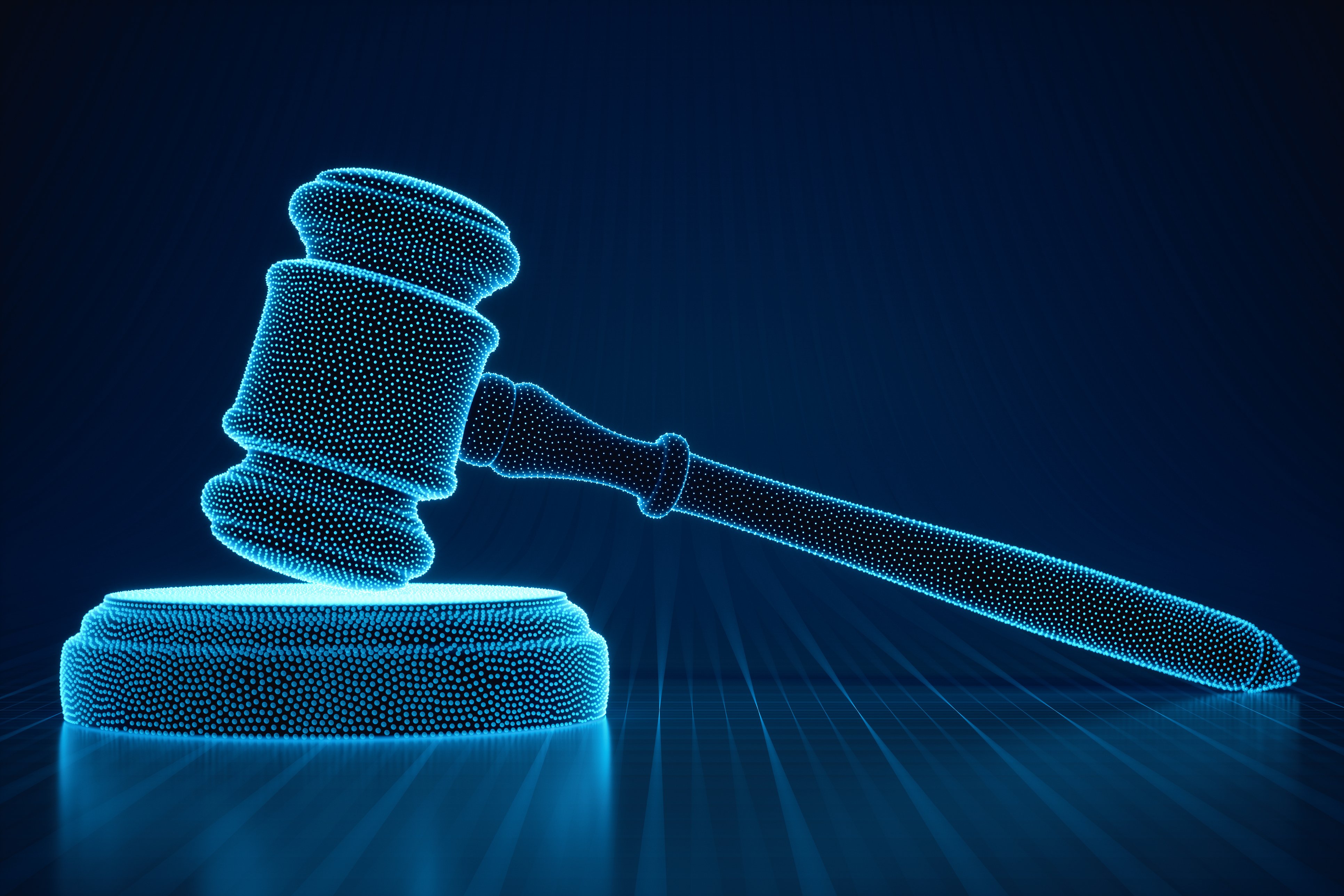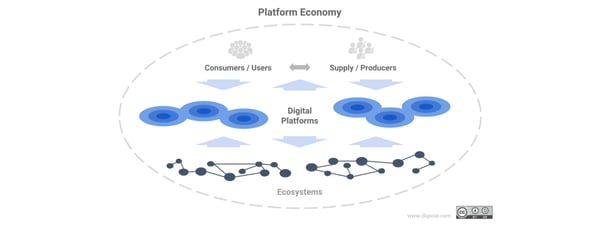February 24, 2020
 by Chris Ciligot / February 24, 2020
by Chris Ciligot / February 24, 2020

What do businesses like Airbnb, Uber, and Amazon have in common?
They are all part of a new economic revolution known as the platform economy.
Driven by technological innovations and increased online connectivity, these businesses are redefining how we live, work and play. Uber has revolutionized how we hail a taxi, Airbnb changed the way we book a room, and Amazon has completely disrupted the way we shop.
The companies above have revolutionized the way businesses utilize web and mobile app-based platforms to transform the way they build and deliver services. In doing so, they have created new market conditions that have disrupted their respective industries, forcing others to follow suit or rapidly lose market share.
However, while these companies have found success, it has become apparent that there is a lack of policy in place to govern and protect the users (customers and employees) of these platforms when compared to traditional enterprises. This economic shift has posed new challenges and questions for society, the labor market, and organizations. For example, are Uber and Lyft drivers employees or contractors?
What labor laws apply to them? It is for this reason, platform governance will be a big focus in 2020 as governments and mobile-based organizations try to find common ground on how they can protect the user, their privacy, and their rights.
The platform economy is a relatively new phenomenon that has seen massive success in recent years. An increasing number of businesses are beginning to adopt this business model along with a list of best practices and digital strategies to remain competitive. By definition, the platform economy refers to any type of digital platform that uses the internet to connect individuals and facilitate interactions between them.
This business model consists of three aspects: the platform, the worker, and the customer. It is the job of the platform to connect people with demand (the customer) to people that provide supply (the worker).

It only takes a quick Google search to uncover a host of negative headlines and research that points to the numerous issues embedded in a platform economy. While yes, these platforms almost always deliver desired outcomes (i.e. Uber brings a person from point A to B) for both the customer and platform, the lack of policy has resulted in a host of loopholes that lead to users of these platforms being scammed, workers being treated unfairly, and the businesses themselves avoiding regulations set forth by existing laws because they don’t fit the definition of the traditional businesses these laws govern. Just take a look at Netflix’s battle with the CRTC.
The term platform governance essentially refers to the rules, practices, and design decisions put in place to influence how content is filtered and presented and to monitor the behavior of a community to ensure cooperation and prevent abuse amongst users. As mentioned above, because of the unique circumstances that surround the platform economy, there is a noticeable lack of policy to govern these new types of business.
There is a gray area where the traditional policy does not apply. It is for this reason that the definition of platform governance continues to shift. What role does government policy play in policing these platforms? What role falls on the platform itself? What role do the app developers that work on building these platforms play?
Ultimately, if these businesses want to continue to be viable, all three players need to work together to develop policies that will govern these platforms to provide the best possible user experience to ultimately please both the user and the business.
Let's explore three areas that platform governance needs to address this year.
Accountability is the main concern for users of platforms like Airbnb for example. Accountability addresses the concern around who is ultimately responsible for the management of the user’s security, data, and private information. Is it the platform? The app developer? The worker? What happens when a platform is hacked and personal data is taken? Who takes the blame?
Airbnb has been at the forefront of fighting a battle of accountability. Numerous scams have come to light as of late, but one of the most prominent scams deals with hosts using the platform to advertise fake listings.
The scam usually follows the following framework: A user pays X amount of dollars to stay at the selected location; however, before check-in, the host calls about an emergency (a flood, broken air conditioner broken, etc.) and proceeds to offer the client with the opportunity to stay at another one of their properties. Unfortunately, the alternative always turns out to be a less desirable property. At this point, the guest has already paid and checked-in, and due to Airbnb’s policies, can’t request a refund as this is only possible before check-in.
While for some cases (after complaints have been made public) Airbnb has taken accountability and offered a refund to scammed users, questions remain as to when user protection and safety will become a priority. The answer will be explained below.
Currently, there is no protocol in place to determine the level of regulations these platforms need to meet in terms of safety standards, taxes, compliance, protection of rights and interests, and fair competition. Because these platforms are drastically different from traditional business models, there is a gray area in terms of what existing regulations apply. Specifically in regards to worker rights and labor laws.
For example, what labor laws and worker rights apply to Uber or Lyft drivers? Are they employees or contractors? Policymakers often find it difficult to enforce the existing policy as these platform-based operations do not fall under what is traditionally defined as a business. To make things even harder, Uber and Lyft both agree that “the platform is facilitating interaction between two or more parties; as a result, we are not an employer."
Therefore, those offering to drive for either platform aren’t technically entitled to be protected by certain rights. For those workers, this could greatly impact their well-being and socio-economic status.
Another major concern that should be addressed with platform governance is related to the reliability of the information we receive over platforms such as Youtube, Facebook, and Twitter. These platforms have replaced traditional information filtering techniques (editors, researchers, trusted institutions) with algorithms that offer very low forms of content moderation and control.
In an economy where marketers are fighting for attention, using the careful placement of keywords to be favored by these algorithms, these platforms seem to be more concerned with the dollar value associated with a post rather than the quality of the content.
However, it has been mentioned recently that Facebook is trying to enforce stricter content rules to help fight this battle and to ensure that the information its users consume is reliable and accurate. This is important because as a society, we rely on this access to broadly shared information to make critical decisions for ourselves and others. Notably, this was a topic of concern in the 2016 U.S. Presidential Election, where it was proven false information was spread on the platform which may have influenced the decision making of individuals.
To answer the question posed above: when will user protection and safety become a priority? It is important to understand the key to platform-based business success. In order for a platform to become successful it is essential they expand as quickly as possible, by capturing more users than the competition.
So, in the early days of a platform, having policies in place that are designed to keep people safe, and ensure there is a low percentage of scams, can actually deter users from signing up on the platform, slowing user acquisition rates.
This is a barrier to entry and therefore counterproductive. However, all of the platforms mentioned throughout this article have now reached a point where they are large enough to be able to begin taking the steps needed to make everyone safe and happy. We are already seeing this with platforms like Facebook introducing new policies regarding content, and Uber introducing policies that ensure better vetting of their drivers.
As these platforms have begun to see the real world, potentially life-threatening consequences their platforms pose for users they will continue to place importance on focusing on this aspect of their business.
As technology continues to increasingly become ingrained in our daily routines and how we function as a society, these platforms know all too well that developing a relationship built on trust with all users of a mobile platform will be the key longevity, or risk losing the users the worked all too hard to aquire in the first place.
Now that you're equipped with knowledge, it's time for you to find the best governance, risk, and compliance software on the market. View available options on G2.
Chris is a Marketing Assistant at Clearbridge Mobile, a mobile app development company helping companies build better relationships with customers by delivering best-in-class mobile app experiences. He writes about all things related to mobile app development, UX/UI, strategy, and marketing. In his spare time Chris can be found with a guitar in his hand, jamming along to his favorite tunes.
Once the app development process is completed and your mobile product is ready to hit the...
 by Chris Ciligot
by Chris Ciligot
It’s been over a decade since the first apps were introduced to the world in Apple’s App...
 by Chris Ciligot
by Chris Ciligot
Successful mobile app development does not end with the release of a mobile product.
 by Chris Ciligot
by Chris Ciligot
Once the app development process is completed and your mobile product is ready to hit the...
 by Chris Ciligot
by Chris Ciligot
It’s been over a decade since the first apps were introduced to the world in Apple’s App...
 by Chris Ciligot
by Chris Ciligot


